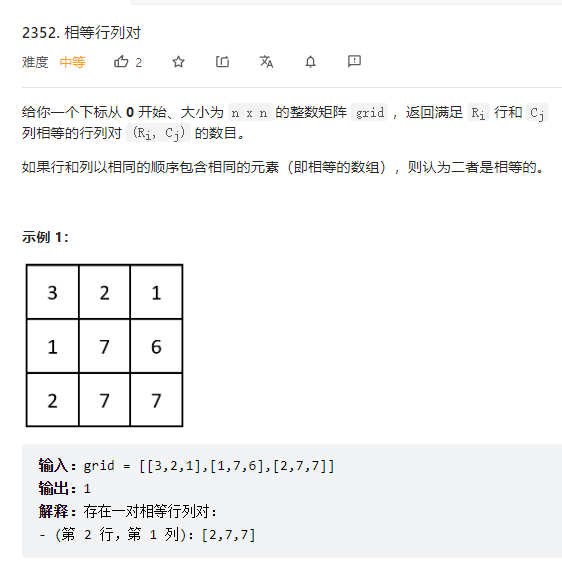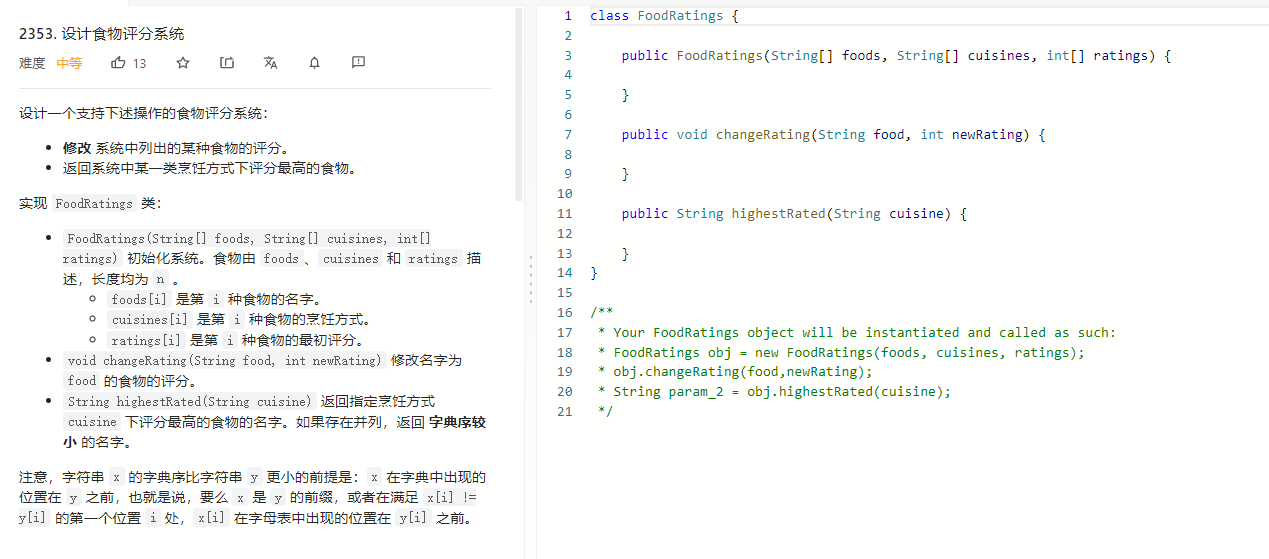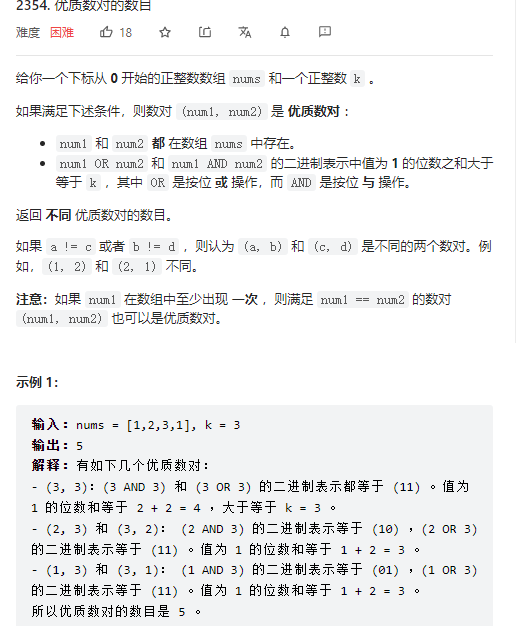只记录一下对我而言比较有意义的题目
本期总结:
考虑用Pair包装而不是设计class实体类
var特性可以简化变量名的打印
双点有序(>k)等问题,优先考虑用双指针而不是二分, 先确定固定哪个点,再看怎么移动,最多就4种情况。
看着很简单啊,我的想法是直接对每一行搞成一个字符串, 然后做成hasMap,记录这个字符串出现的次数
在拿列去map里匹配即可
结果忘记了数字的范围是1-10^9, 并非0-9,不能直接拼,还得加逗号。痛失五分钟。
1 2 3 4 5 6 7 8 9 10 11 12 13 14 15 16 17 18 19 20 21 22 23 24 25 26 27 28 29 30 31 32 33 class Solution { public int equalPairs (int [][] grid) { int ylen = grid.length; int xlen = grid[0 ].length; String[] rows = new String [ylen]; String[] cols = new String [xlen]; Map<String, List<Integer>> map = new HashMap <>(); for (int y = 0 ; y < ylen;y++) { StringBuilder sb = new StringBuilder (); for (int x = 0 ; x < xlen;x++) { sb.append(grid[y][x]).append("," ); } String s = sb.toString(); if (!map.containsKey(s)) { map.put(s, new ArrayList <>()); } map.get(s).add(y); } int count = 0 ; for (int x = 0 ; x < xlen;x++) { StringBuilder sb = new StringBuilder (); for (int y = 0 ; y < ylen;y++) { sb.append(grid[y][x]).append("," ); } String s = sb.toString(); if (map.containsKey(s)) { count += map.get(s).size(); } } return count; } }
另外java处理字符串和map问题确实比python要麻烦,如果要冲速度,我是不是得学一下python?
题解里的python,可以快速转数量统计的map
1 2 3 4 class Solution : def equalPairs (self, grid: List [List [int ]] ) -> int : cnt = Counter(tuple (row) for row in grid) return sum (cnt[col] for col in zip (*grid))
很明显就是一个会更新的优先队列集合
需要用优先队列加一个检查更新的map实现。
1 2 3 4 5 6 7 8 9 10 11 12 13 14 15 16 17 18 19 20 21 22 23 24 25 26 27 28 29 30 31 32 33 34 35 36 37 38 39 40 41 42 43 44 45 46 47 48 49 50 51 52 53 54 55 56 57 58 59 class FoodRatings { class Food { String name; String cuisines; int rate; public Food (String name, String cuisines, int rate) { this .name = name; this .cuisines = cuisines; this .rate = rate; } } Map<String, Queue<Food>> queues; Map<String, Food> nowFoodMap = new HashMap <>(); public FoodRatings (String[] foods, String[] cuisines, int [] ratings) { int len = foods.length; queues = new HashMap <>(); for (int i = 0 ;i<len;i++) { Food food = new Food (foods[i], cuisines[i], ratings[i]); nowFoodMap.put(foods[i], food); if (!queues.containsKey(cuisines[i])) { queues.put(cuisines[i], new PriorityQueue <>((a,b)->( a.rate != b.rate ? (b.rate - a.rate): (a.name.compareTo(b.name))))); } queues.get(cuisines[i]).offer(food); } } public void changeRating (String food, int newRating) { String cu = nowFoodMap.get(food).cuisines; Food food1 = new Food (food, cu, newRating); nowFoodMap.put(food, food1); queues.get(cu).offer(food1); } public String highestRated (String cuisine) { Queue<Food> queue = queues.get(cuisine); while (!queue.isEmpty()) { Food food = queue.peek(); if (food != nowFoodMap.get(food.name)) { queue.poll(); } else { return food.name; } } return null ; } }
但是定义类的时候比较麻烦,后面可以考虑以下的效率优化:
用Pair做二元组,避免定义内部类麻烦
用var避免定义变量类型
其实这个脑筋急转弯通过纸上推演,很快能得到
num1 OR num2 和 num1 AND num2 的1的个数,等同于num1和num2中1的个数总和
就变成就一个数组中,a[x] + a[y]共有多少对
这个子问题的解法我想复杂了,竟然想到用二分法。。。又因为很久没写了,对二分不熟了,导致浪费了大量时间确认二分如下:
1 2 3 4 5 6 7 8 9 10 11 12 13 14 15 16 17 18 19 20 21 22 23 24 25 26 27 28 29 30 31 32 33 34 35 36 37 38 39 class Solution { public long countExcellentPairs (int [] nums, int k) { Set<Integer> set = Arrays.stream(nums).mapToObj(Integer::valueOf).collect(Collectors.toSet()); int [] ontCounts = new int [set.size()]; int [] newNums = new int [set.size()]; int t = 0 ; for (int s : set) { newNums[t++] = s; } nums = newNums; for (int i = 0 ; i < nums.length;i++) { ontCounts[i] = Integer.bitCount(nums[i]); } Arrays.sort(ontCounts); long result = 0 ; for (int i = 0 ; i < nums.length;i++) { int oneCount = ontCounts[i]; int needOneCount = k - oneCount; int left = 0 , right = nums.length; while (left < right) { int mid = left + (right - left)/2 ; if (ontCounts[mid] < needOneCount) { left = mid+1 ; } else if (ontCounts[mid] >= needOneCount){ right = mid; } else { break ; } } int select = right; result += Math.max(0 , ontCounts.length - select); } return result; } }
比二分要更快速的可能是用双指针求解这类问题
但是双指针的方向可能要好好想想
即2个指针哪个优先固定, 再移动哪个,哪个方向移动
这题需要left=0, right=length, 固定住left, 让right移动找到一个位置后,right右边的所有点和left想家肯定都满足> k
1 2 3 4 5 6 7 8 long result = 0 ;int left = 0 , right = ontCounts.length - 1 ;for (;left<ontCounts.length;left++) { while (right >=0 && ontCounts[left] + ontCounts[right] >= k) { right--; } result += (ontCounts.length - 1 - right); }




